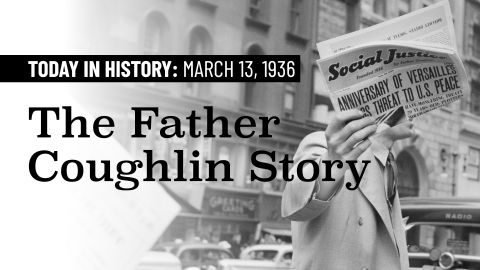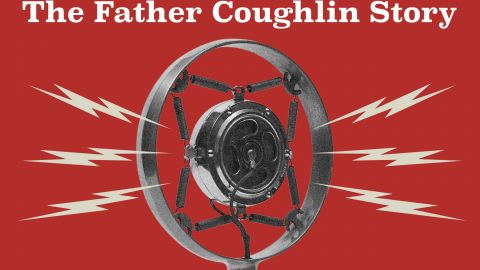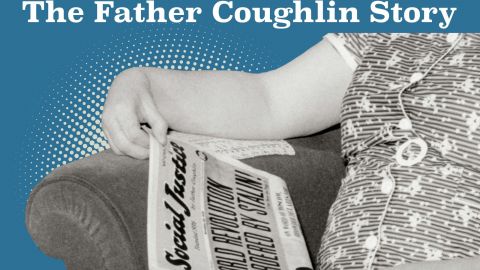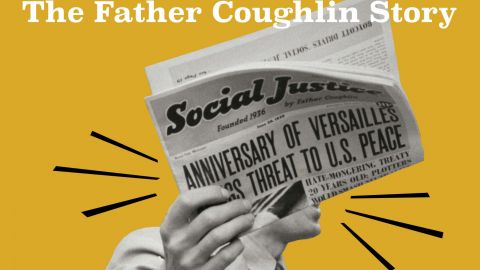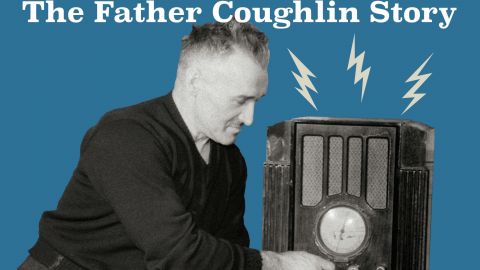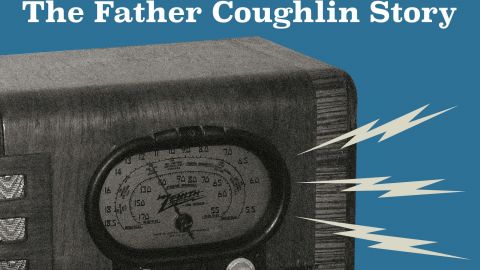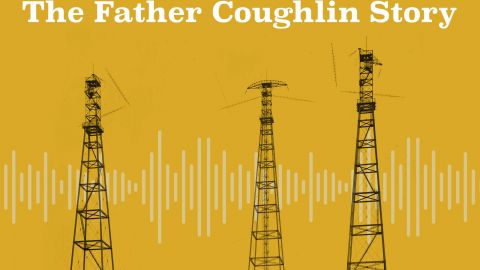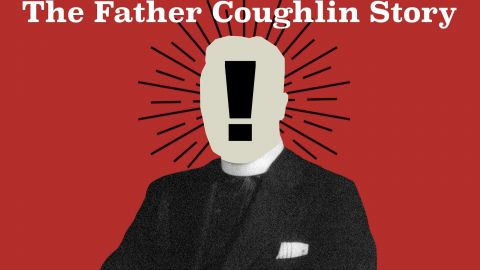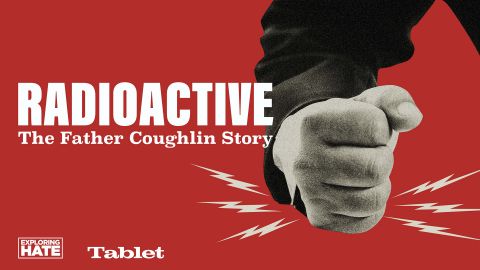The following is a production of Tablet Studios in association with The WNET Group’s reporting initiative, Exploring Hate: Antisemitism, Racism and Extremism, and with support from Maimonides Fund.
Radio Announcer: 1929, the Financial House of Cards collapses and the overinflated stock market plunges into a Great Depression…
Andrew Lapin: Just how traumatizing was the Great Depression? Even today, nearly a century later, it’s hard to come to terms with how thoroughly this event shocked and disrupted the country. Soon after the massive stock market crash of 1929, one third of all American banks collapsed.
Radio Announcer: The people you see gathered outside the stock exchange are due to the greatest crash in the history of the New York Stock Exchange and market prices.
Andrew Lapin: One in four Americans were without a job, and a whole lot of people lost their homes. Where did all these people go? Giant shantytowns. Poorly constructed, miserable encampments for the newly homeless and jobless. There were around 6000 of them nationwide. In some cities, government officials tried to burn these ramshackle communities to the ground, but they kept sprouting up because people had nowhere else to go. The shantytowns weren’t much to look at, but they were fully functioning societies. Some even elected their own mayors. No matter which of these tent cities you were in, from Seattle to St. Louis, you’d hear folks calling them by the same name: Hoovervilles. Across the country, nearly everyone blamed the Great Depression on President Herbert Hoover and his Republican Party. People were so fed up that they were ready for a radical change. If you were in a Hooverville lucky enough to have a radio, you could probably hear where that change might be coming from. There was one man on the airwaves who, he reminded his listeners, was completely financially supported by the people, totally free of corporate influence. The country’s biggest truth teller with God on his side.
Charles Coughlin: And by no means do I intend to retreat from this fight of driving the money changers from the temple. They may hold power over politicians but they hold no power over the pulpit of the Catholic Church that dares preach for the alleviation of misery, that dares inveigh against usury, and that dare claimors for an honest living annual wage free from the sins of the past and free from the excesses of the future. God be with you, God, be with all of us in this fight that shall last until death comes, if necessary!
Andrew Lapin: I’m Andrew Lapin and this is Radioactive, an eight part series from Tablet Studios and Exploring Hate about Father Charles Coughlin, the famous radio priest, notorious antisemite, and a man who changed American culture and politics forever.
Episode Four: Driving the Money Changers From the Temple.
Andrew Lapin: Economists, historians and policymakers spent decades studying the precise causes of the Great Depression. Watching it unfold in real time, Father Charles Coughlin had little doubt who was to blame: bankers, perfidious politicians and the communists who had infiltrated labor leadership.
Charles Coughlin: The exploited masses of labor victimized by prolific promises of politicians and deceived so frequently by unsound labor leaders.
Andrew Lapin: In July of 1930, less than a year into the Great Depression, Coughlin made his way to Washington, D.C., to testify before Congress. By then, his broadcasts were devoted largely to sharing his favorite theory: America was under attack. The Reds and Russia were spreading chaos and discontent.
Andrew Lapin: It was the communists who gave us the father of this ominous revolution: the Hebrew, Karl Marx.
Charles Coughlin: This is America! Let it be a Christian America, guided by the principles, not of the athiest Jew, Karl Marx, but by the principles of the Christian Jew, Jesus Christ.
Andrew Lapin: These allegations were music to the ears of Congressman Hamilton Fish III. Fish saw Communism as a clear and present danger. They were fighting it efficiently in Germany, he thought, which is why he sponsored a study of a promising anti-Communist party rising through the ranks: the National Socialists. Fish also used his office to distribute copies of the protocols of the Elders of Zion, the anti-Semitic forgery we discussed in episode one. The protocols were a helpful tract, he believed, if you wanted to understand who controlled all the money in the world. In Father Coughlin, he found a clear and unequivocal voice to deliver a warning against the dangers to the honest Christian American way of life. Here’s a reenactment of Coughlin’s testimony before Fish’s Congressional Committee.
Questioner: Have you had occasion to come into contact with some communistic activities?
Charles Coughlin: Yes, sir, to this extent: I have a chain of broadcasting stations and I have received 300,000 letters from my work in this field,
Questioner: Isn’t it that the Communists seek to socialize by direct force?
Charles Coughlin: I will give you a little information. Any American who professes to have dabbled into this subject of socialism has heard of the name of Adam Weishaupt. The German professor, in the year 1776, organized his sympathetic associates into the order of the Illuminati. Said he, “destroy Christianity and civilization will be happy.” Such is the thought of the Old Testament, if I may call it such, of socialism, such is the religion of its author.
Questioner: And do you think there is any danger of the Communists making great strides?
Charles Coughlin: Yes, sir. In the French Revolution, there were only twenty two thousand interested in it. The Russian Revolution of 1917 had less than 500,000 communists in it that were interested in it. We have approximately 500,000 communisticly minded people in this country, at least. Unrest is on the increase.
Questioner: Do you think there is any danger of communism in this country?
Charles Coughlin: I think by 1933, unless something is done, you will see a revolution in this country.
Andrew Lapin: This was the story of an imminent communist revolution and the one honest priest fighting it. It was precisely the sort of soap opera radio was made for, and it brought Father Coughlin a steadily growing stream of listeners. So many that by the fall of 1930, CBS began syndicating his programs; nationwide at first and then, via a shortwave set up, to the entire world. How dramatic was Father Coughlin’s rise? Again, numbers alone tell a stunning story. Three weeks after CBS started carrying Coughlin’s program, according to his biographer Donald Warren, the radio priest received so many letters, it took 55 clerks to sort them all out. That number jumped to 96 clerks within a year. And soon, the United States Postal Service had to build a post office in Royal Oak, dedicated entirely to letters addressed to Father Charles Coughlin. In an average week, Warren estimated, Father Coughlin received 80,000 letters. But at the time, those numbers could get even more exaggerated.
Radio Announcer: Father Coughlin becomes a full fledged national character. His secretarial staff looks like big business. They must be ready to answer a million letters in a single week.
Charles Coughlin: By that date, ladies and gentlemen, you have challenged me by millions of your letters.
Andrew Lapin: The letter writers were thanking Coughlin for revealing the communist threat. Coughlin was telling them exactly what to do about it.
Charles Coughlin: Before they grow more forceful and powerful, it is time to eradicate them mentally, spiritually, and physically from our midst. It is a combat upon whose outcome the destiny of America hinges.
Andrew Lapin: Not all Americans were thrilled with Father Coughlin’s sermons. At least three hundred and fifty thousand of them wrote in to tell CBS that the radio priest was trafficking in wild and spurious accusations. The network was starting to get nervous that their star pundit was crossing one too many lines. Not one to let a good conflict go to waste, Father Coughlin rose to the occasion. Shortly after New Year’s Day of 1931, he put out a press release and announced that he would not be broadcasting his sermon that week. Nameless enemies had perpetrated, quote, “a cowardly behind the back attack with the hope of throttling free speech.” Giving the drama a week to build up, Father Coughlin returned to the radio pulpit on January 11th to deliver his sermon. It was entitled “Prosperity,” and it said that the roots of America’s depression woes could be found in the Treaty of Versailles that ended World War One. Coughlin said this international agreement had manipulated the stock market, wrecked businesses and demolished the American middle class in the name of peace and opened the doors for unscrupulous Reds to get a toehold in the United States.
Paul Hanebrink: Right after World War I, you see a lot of nationalist talk about what they thought of as threats to their nation’s sovereignty.
Andrew Lapin: Paul Hanebrink is a historian of European nationalism and antisemitism at Rutgers University.
Paul Hanebrink: Somehow, this threat that was both a fifth column within and yet forces without, and there’s somehow this shadowy connection between them is undermining sovereignty. I think that anxiety and that fear is very common. There’s a special variant of it within a kind of Right-Wing Catholic context, but it’s also very common across nationalist cultures and nationalist contexts, you know, from country to country.
Andrew Lapin: By the end of that season, CBS had dropped Father Coughlin from its schedule. He was getting too controversial for them. By that point, he didn’t need them. In the fall of 1931, he began assembling a network of his own, made up of independent stations everywhere from St. Louis to Portland, Maine. By 1932, he had 27 stations carrying his word, financially supported by regular small donations from his listeners: the Radio League of the Little Flower. As much as Father Coughlin loved to rant about Communists secretly infiltrating the nation, he knew the country’s biggest villain was right out there in the open. Just ask anyone who lived in a Hooverville. The fall of 1931, when Coughlin went independent, was also when the presidential election was beginning to heat up. President Hoover was struggling to beat back the charge that the Great Depression was his fault.
Herbert Hoover: I rest the case of the Republican Party upon the intelligence and the just discernment of the American people. Should my countrymen again based upon me the responsibilities of this high office, I shall carry forward the work of reconstruction.
Andrew Lapin: The president was a perfect target for a radio star on the rise. There was another reason why Coughlin could now feel emboldened to attack the White House. Without CBS, he didn’t have to worry about corporate sponsors or network standards stopping him. He only needed the continued approval of his superior, Bishop Gallagher, who willingly granted it to his favorite pupil. From his pulpit in Royal Oak, the priest was ready to take aim at the biggest target in America. In a sermon broadcast on February 12th, 1932, Father Coughlin told his listeners that Hoover was behind an investment scam that helped wealthy fat cats get richer by convincing the public to throw their funds into largely worthless mines. Here’s a reenactment of that speech.
Charles Coughlin (actor): In 1912, Mr. Herbert Hoover termed as “idiots” those people who would listen to the suave salesman talk of promoters, who by deceit and subterfuge, coaxed money from widows, as was done here in Royal Oak and elsewhere to invest with many mining ventures, which were failures before they were started. Idiots who partied with it. Idiots. I hang on that word idiots. It is a word to conjure with. I D I O T S, idiots. My friends, we are deeply indebted for this shocking piece of information. We are taught that it is quite moral and just to filch money from innocent outsiders and pass it into the soft hands of the guilty insiders. The world around us is facing the sordid burning facts of unemployment, of starvation, of unjust taxation. No longer can the people who love their homes and love their country be lulled into inaction by the idle optimism of the sleek parasites who exist on the crumbs dropped from the advertising table of calloused, conscienced exploiters.
Andrew Lapin: The Hoover campaign largely dismissed the attack and the many more that followed in weeks to come. Theodore Joslin, the president’s press secretary, wasn’t impressed by the rubes who took their political cues from Father Coughlin. “It must be borne in mind,” he wrote a confidante, “that the moronic mind has a vote. And alas, too many voters are in this class.” But the week after Father Coughlin’s initial attack on Hoover, more than one million letters of support poured into the Shrine of the Little Flower. These minds wanted to know who their champion would champion. Father Coughlin found his man in Hoover’s challenger, the Democratic candidate for president, Franklin Delano Roosevelt.
Robert Clark: They weren’t particularly close. Coughlin actually irritated Roosevelt immensely. He thought he was presumptuous and he thought he was rude.
Andrew Lapin: Robert Clark is the director of archives for the Rockefeller Archive Center in New York and was the longtime archivist for the Franklin D. Roosevelt Presidential Library.
Robert Clark: Roosevelt, above all things, was a master politician, and he understood and appreciated the effectiveness of Coughlin’s radio broadcasts, that he had a certain political power because of the following that he had. I mean, at his peak, I think Coughlin had like thirty million or forty million listeners on the radio, which is a pretty good chunk of the population when you understand that in 1935, the population was a hundred and twenty seven million in the country. So that’s a pretty good chunk that you have to respect if you’re a politician.
Andrew Lapin: Coughlin vigorously campaigned for Roosevelt.
Charles Coughlin: It is almost preposterous on my part to advocate your loyalty to Franklin D. Roosevelt. The events of the past three weeks are eloquent in themselves. Our laborers are being restored to remunerative operations. Our factories are open. The prices of our commodities have been raised. Why, may I ask you? Simply because the money changers are being driven from the temple. Ladies and gentlemen, this is the day, despite all opposition to the contrary, that you remain steadfast behind the one man who can save this civilization of ours. It is either Roosevelt or ruin.
Andrew Lapin: “Roosevelt or ruin.” The perfect slogan for a political star on the rise. Coined by Father Coughlin himself, the catchphrase became ubiquitous among FDR supporters. The message stuck. On November 8th, 1932, Americans took to the polls. Herbert Hoover carried Pennsylvania and Delaware, Connecticut and Rhode Island, New Hampshire, Maine and Vermont. FDR carried every other state in the Union. All 41 of them. A landslide victory rarely before seen in American history.
FDR Campaign: It looks, my friends, like a real landslide this time.
President Franklin D. Roosevelt: I am glad of this opportunity to extend my deep appreciation to the electorate of this country, which gave me yesterday such a great vote of confidence. This clear mandate shall not be forgotten and I pledge you this and I invite your help in the happy task of restoration.
Andrew Lapin: People may have said the blowout election results were because of FDR charisma or the dire state of the country, but Father Coughlin had a different take away. FDR won because of him. He was no longer just a preacher or even a radio star. He was a political kingmaker with God behind him.
Andrew Lapin: If the Lord giveth his support, the Lord could taketh away. How Father Coughlin split from FDR and found new enemies
Charles Coughlin: Trying to keep cool with Cal. We’ve tried to become hard-boiled with Hardy. We try to stay out of war with Woodrow. And we’ve tried to write a new deal with Franklin Delano. We’re through with the shambottles of politicians and now we’re on our own!
Andrew Lapin: Radioactive is hosted by me, Andrew Lapin, and is a production of Tablet Studios in association with The WNET Group’s reporting initiative Exploring Hate: Antisemitism, Racism, and Extremism, and with support from Maimonides Fund. The show was produced and edited by Josh Kross and Robert Scaramuccia with Quinn Waller. Our managing producer is Sara Fredman Aeder. Our executive producers are Liel Leibovitz and Stephanie Butnick. Our theme music is from the Ghostwriter and was composed by Alexandre Desplat. All speeches and material of Father Coughlin are authentic to the source, as well as music and other audio from his radio program. Voice acting in this episode by Daniel Strauss and Bob James. Special thanks to this episode to Irv Drasnin, director of “American Experience: The Radio Priest.” This episode was recorded at Michigan Radio, Ann Arbor’s NPR station. Our recording engineer is Peg Watson. Please go rate and review us wherever you listen to podcasts. For more information about the show and all of Tablet’s podcasts, please visit tabletmag.com/podcasts.
Major funding for Exploring Hate has been provided by: The Sylvia A. and Simon B. Poyta Programming Endowment to Fight Antisemitism, Sue and Edgar Wachenheim III, Charlotte and David Ackert, The Peter G. Peterson and Joan Ganz Cooney Fund, and Patti Askwith Kenner. For a complete list of funders, please visit pbs.org/exploring hate.

